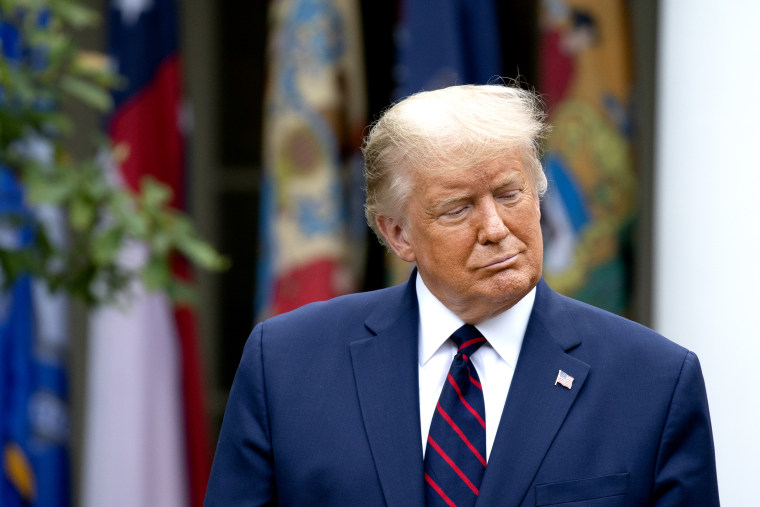In one of the 2016 presidential debates, Hillary Clinton made what she thought was a devastating charge against Republican presidential nominee Donald Trump: He didn't pay his federal income taxes! Even before Clinton finished her sentence, Trump interrupted her: "That makes me smart." It was, in many ways, a telling retort, both in substance and in delivery.
And for the last three years, Trump has continued to remind Americans just how smart he is. He's so smart that he doesn't have to pay taxes. He's so smart that he doesn't have to listen to his scientists or his advisers or members of his intelligence community.
He’s so smart that he doesn’t have to wear a mask amid a pandemic.
He's so smart that he doesn't have to pay taxes. He's so smart that he doesn't have to listen to his scientists.
To judge by the latest New York Times stories about Trump's tax history, to say nothing of the president’s positive Covid-19 test, he's not as smart as he claims to be. And to judge by his comments during his first presidential debate with former Vice President Joe Biden, the Democratic nominee, Trump is afraid we know it.
The Times story doesn't describe elegant tax planning of the sort that specialized attorneys and accountants produce for their clients at astounding hourly rates. If you're looking for charitable remainder unitrusts or generation-skipping transfer tax exemptions, fuhgeddaboudit. Instead, we're reading about blunt-force instruments. They're used by many people — it's just that Trump has used them more.
Still, Trump's debate retort to Clinton four years ago was shrewd. Many Trump supporters likely don't earn a lot of money. If they are employees, their employers report to the U.S. government the amount of their incomes and their various deductions. Unlike Trump, these supporters don't have much control over their payments to the federal tax man.
But Trump's smartass comment reassured them: You, too, he was saying, are smart. They knew the inside story — that the system was rigged. If they had the money to hire lawyers, Trump was telling them, they wouldn't have to pay federal income taxes, either.
That's Trump's appeal, one he shares with other populist politicians: You may not be rich or powerful, but you're in the know. And I, rich and powerful, will champion you against the people who have used the rigged system to steal what should be your money.
So if Trump succeeded for years — as he did — in keeping his tax returns from the public without suffering political damage, we shouldn't be surprised. His cynicism matches and affirms that of some of his strongest supporters.
But the string eventually ran out. On the financial side, The Times got hold of years of Trump's federal tax return information — and released it in a way that inflicted maximum humiliation. If the initial revelations don't break new ground, the details are riveting. Far more than a tale of tax cheating, it's a chronicle of financial desperation.
The Times portrayed Trump's tax practices as the consequences of his long-running financial failures. Trump inherited a great deal of money, squandered his inheritance on losing businesses and was rescued by his father. He then squandered these funds on what turned out to be other losing businesses and was saved again — this time by a producer who saw the TV appeal of Trump's gilded lifestyle and paid him handsomely to display it. Trump then squandered this second infusion of rescue funds on still more losing businesses.
Instead of earning money, Trump's businesses have generated losses so big that they served to reduce his taxes — not just in the years in which the losses occurred, but over many adjacent years.
Trump solved the associated problem of how to support himself by characterizing personal expenses as business expenses — and borrowing vast amounts of money. But reduced taxes all by themselves don't pay the rent, so Trump has also run up a whole lot of debt. It's unclear just who owns this debt, amounting to hundreds of millions of dollars, some of it soon coming due. We'll know soon enough.
In the short run, Trump's arrangement might look quite clever. In the longer run, however, the loss carryovers expire, the borrowed money comes due and he doesn't look so smart.
In the debate Tuesday, the issue of Trump's taxes came up — but mainly as part of the charge that it's unfair for a wealthy guy like Trump to pay so much less federal income tax than ordinary workers. That's an issue, sure — but it's not the one that most exercises Trump.
For a clue to what really bothers him, we should look to the moment when Biden, criticizing Trump's response to the coronavirus pandemic, said "a lot more people are going to die" unless Trump "gets a lot smarter a lot quicker."
"Don't ever use the word 'smart' with me," Trump shot back vehemently, accusing Biden of having graduated from college with a very low class rank. "Don't ever use that word, because you know what? There's nothing smart about you, Joe." Less than a week later, Trump and first lady Melania Trump tested positive for Covid-19, potentially setting off a massive chain reaction given the Trump entourage's propensity to travel without masks.
So Trump cares deeply about whether we see him as smart. But looking at the mess he's created for himself, those of us watching this disaster unfold suddenly seem a lot smarter.



